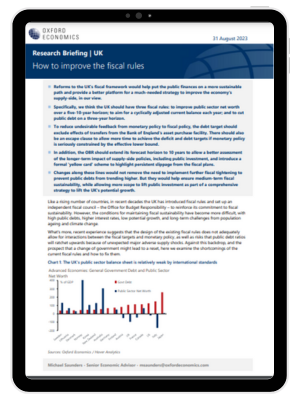How to improve the fiscal rules

Reforms to the UK’s fiscal framework would help put the public finances on a more sustainable path and provide a better platform for a much-needed strategy to improve the economy’s supply side, in our view.
Specifically, we think the UK should have three fiscal rules: to improve public sector net worth over a five-10-year horizon; to aim for a cyclically adjusted current balance each year; and to cut public debt on a three-year horizon.
To reduce undesirable feedback from monetary policy to fiscal policy, the debt target should exclude the effects of transfers from the Bank of England’s asset purchase facility. There should also be an escape clause to allow more time to achieve the deficit and debt targets if monetary policy is seriously constrained by the effective lower bound.
In addition, the OBR should extend its forecast horizon to 10 years to allow a better assessment of the longer-term impact of supply-side policies, including public investment, and introduce a formal ‘yellow card’ scheme to highlight persistent slippage from the fiscal plans.
Changes along these lines would not remove the need to implement further fiscal tightening to prevent public debts from trending higher. But they would help ensure medium-term fiscal sustainability, while allowing more scope to lift public investment as part of a comprehensive strategy to lift the UK’s potential growth.
Tags:
Related posts

Post
Japan’s Rising Political Instability Will Undermine Fiscal Discipline
The ruling Liberal Democratic party (LDP) and its partner Komeito lost their majority in Japan's upper house elections on July 20. Although Prime Minister Shigeru Ishiba will likely stay to avoid political gridlock, especially to complete tariff negotiations with the US, the political situation has become fluid and could lead to a leadership change or the reshuffling of the coalition.
Find Out More
Post
July baseline to fully adopt the One Big Beautiful Bill
The July baseline forecast will fully adopt the Republican tax-and-spending bill, which is poised to become law by the July 4 deadline.
Find Out More
Post
New NATO target in line with our previously revised forecast
NATO's commitment to spend 5% of GDP annually on defence by 2035 is broadly in line with the change to our defence-spending assumptions that we made in March, when we lifted core defence spending from 2% of GDP to 3% by 2030 and to 3.5% by 2035.
Find Out More